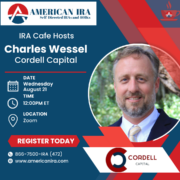What is the Self-Directed Solo 401(k) Plan? Answers to Common Questions
The 401(k) Plan. It’s one of the most ubiquitous terms in all of retirement investing. Many people think about the 401(k) as being synonymous with retirement savings in general. Yet when you have your own company or are self-employed, many find it difficult to invest this way. Fortunately, there’s one option that many investors have access to: the Self-Directed Solo 401(k) plan. This one-participant plan has some strict rules—but also, plenty of investing freedom once you’re able to open one. Here’s what you need to know about the Solo 401(k) Plan, along with some answers to common questions about how it might work.
The Self-Directed Solo 401(k) Plan: How it Works
The Self-Directed Solo 401(k) retirement plan provides you with investment options that go beyond what many people are used to with an employer-sponsored plan. With an employer sponsored plan, there’s often a traditional brokerage arrangement when employees have to choose from a limited number of funds. However, with a Self-Directed Solo 401(k) plan, investors can use the retirement account to invest in a wide range of assets and asset classes—going beyond even the stock market to invest in real estate, precious metals, and more.
This works because when you work with a Self-Directed IRA administration firm, they can accept your buy/sell orders and carry them out on the account’s behalf. With a traditional approach to retirement investing, the custodian on the account may only be willing to offer basic funds and stocks or bonds as part of its offerings in this way. But a dedicated Self-Directed IRA administration firm might be willing to give you the full range and possibilities that come with self-direction.
Why Choose a Self-Directed Solo 401(k)?
Why do so many people choose a Self-Directed Solo 401(k) to begin with? One primary answer is that these accounts have particularly high contribution limits. If you have a lot of money that you want to put towards retirement, you can do so with a Self-Directed SEP IRA or a Self-Directed Solo 401(k). These limits are often variable depending on your income, so we can’t say what they might be. And contribution limits do tend to change over time, reflecting inflation. However, Solo 401(k) plans have some of the highest contribution limits of all the IRA possibilities you have in your arsenal, which is why people with higher incomes might prefer to use a 401(k) plan.
Interested in learning more about Self-Directed IRAs? Contact American IRA, LLC at 866-7500-IRA (472) for a free consultation. Download our free guides or visit us online at www.AmericanIRA.com.









